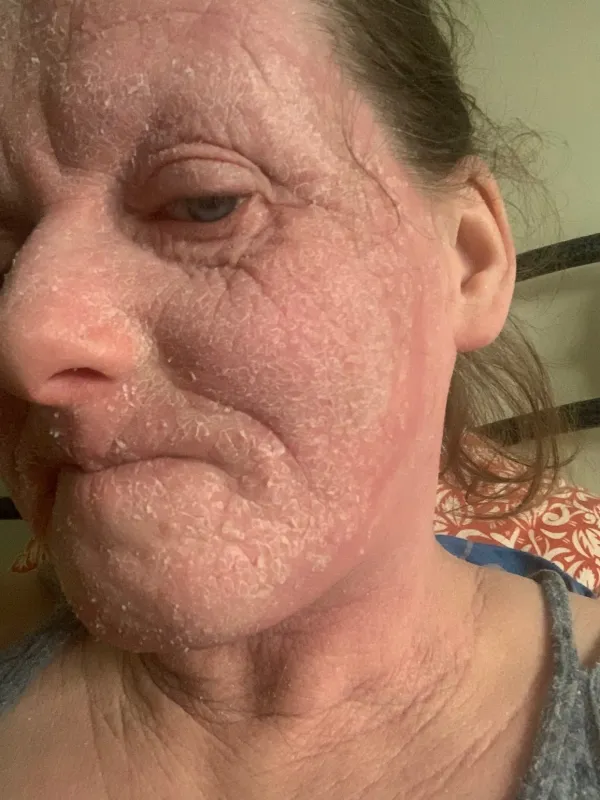It’s been very hard to go out into the world with a face that doesn’t look like anyone else. It’s shocking and dramatic and I don’t blame people for noticing but I do hate it when people feel they have a right to my story.

Going through topical steroid withdrawal these past few years has taught me so much. If you’ve ever said something and wished you could retract it, hit the rewind button and take it all back, here’s some advice that could help.
I’m talking to you and to anyone who has looked at a friend or a stranger and seen their pain and suffering and decided to share a suggestion or enquire about their medical condition. We know you care and we know you are trying to help… but stop, just for a minute and consider the following:
1. Do you REALLY know the person?
Because actually if you are a personal family member or close friend we really don’t mind you asking how we are, because you guys probably DO know the daily struggle. Be prepared though for floods of tears because living with a chronic condition is really hard work. If you don’t really know someone , it’s none of your business. If they want to talk about it and start a conversation then that’s OK, but you have no right to ask. You might think I’m overreacting or being over sensitive… but keep reading…
2. Does it look painful or challenging?
If it looks sore, painful, uncomfortable or challenging then trust that it is and also know that we are also very aware of it. We may have struggled to get ourselves out of the door and definitely don’t want to have our appearance commented on. We are just trying to get through the day and be treated like normal…
3. Are you just interested?
If you’re thinking, crikey I’ve not seen skin like that before… what on earth is going on? That’s just your natural human inquisitiveness kicking in. It’s perfectly normal and it’s what makes us such a fascinating race. We are interested in each other, we ask questions, we want to learn. But there is a time and place for learning. If you genuinely want to talk to someone who you can see has a visible difference, please try to just talk about normal stuff. The weather, compliment them on something they are wearing for instance. Anything but – what’s wrong with you? How did you get burnt? Have you been the doctor about that? We really just want to be normal, to blend in, to be ourselves and be respected by others. Our medical condition is none of your business.
4. Is what you’re about to say kind, helpful or true?
This is something my Nana taught me when I was being particularly vile to my incredibly annoying (at the time – I adore, admire and absolutely cherish her now) little sister. Because if it’s not any of the three things listed above, keep your mouth firmly shut. Just count for a few seconds and you’ll probably realise it’s not wise to comment.
5. Is it just sympathy?
If it’s sympathy, it can come over as patronising and often unhelpful. For instance, if you feel sympathy for someone’s medical condition, never ever say anything like the following… “Oh poor you, I could never live like that.” or “ I could never go out looking like that.” Both statements that have been said to me over and over again. Consider how that makes a person feel. What can they possibly respond? Are they supposed to be feel grateful and thank you for your pity? All it does it pours shame onto them when they probably already feel some shame or embarrassment. They might be strong enough not to take that the wrong way but many people could be crushed or angered by such statements. We are just getting on with our lives as best we can. We don’t have any other choice.
Finally, if it’s empathy you are giving then you’re half way to finding a kind way to engage with someone. If you can stop for a second and really imagine yourself in their shoes, living what they live, you will realise that all they really need is your kindness and respect. Just say Hi, how are you? Can I get you a drink? I love that scarf! Find some safe common ground to get chatting and you’ll be doing them the world of good compared to any of the above problem flag areas.
I’ve wanted to write about this for a while now and find it hard to get the right tone. We know you care, we understand you want to help but honestly, you’re not. Don’t say it, keep it to yourself, because we have tried everything, we are struggling and we do not want advice, just kindness.
If we wanted advice we might ask for it but if we don’t? Just get us tea and cake!
Ruth Holroyd helps people with life limiting chronic conditions such as eczema, topical steroid withdrawal, asthma and allergies. She runs an award winning blog and is the author of two books: The Shape of Skin, a poetry collection for people with eczema, psoriasis, atopic dermatitis, and topical steroid withdrawal, and Anaphylaxis: The Essential Guide: An Action Plan For Living With Life-Threatening Allergies’
Smile is a mental health app for people managing chronic physical health conditions. Download now from Google Play or Apple App store